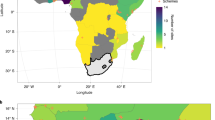Abstract
Government disengagement from day-to-daymanagement of irrigation infrastructure hasbecome a widespread strategy in Asia,Africa and Latin America. This paperexamines a case study of managementtransfer of a rice irrigation scheme inGhana. The criteria used relate toagricultural, financial and economicperformance and environmental sustainability.The study showed that whilstboth cropping intensity and cultivated areadecreased after transfer, the relativelyhigh yields were sustained. The averageproduction cost before transfer decreasedby about 7% from $827/ha to $774/haafter transfer. Most importantly, averagenet income increased by more than 100%from $260/ha to $549/ha after transfer.Very high financial self-sufficiency ratioscoupled with low running cost achieved bythe farmers' co-operative led to theconclusion that transfer has resulted inbetter performance so far.
Similar content being viewed by others
References
Bos, M.G. 1997. Performance indicators for irrigation and drainage. Irrigation and Drainage Systems 11: 119–137.
Dawhenya Smallholder Rice Irrigation Project. 1994. Proposals for the future organisation and management of the Dawhenya Smallholder Rice Irrigation Project. A Draft Report by a co-operative specialist, Ministry of Co-operatives and Rural Development, Accra.
Levine, G. 1990. Some reflections on irrigation performance evaluation. A note presented at the IFPRI-IIMI Workshop on Irrigation System Performance at Pangbourne, UK in February 1990.
Marre, M., Bustos, R., Chambouleyron, J. & Bos, M.G. 1998. The quality of service provided by the irrigation department to the users associations, Tunuyan System, Mendoza, Argentina. Irrigation and Drainage Systems 12: 49–65.
Molden, D.J., Sakthivadivel, R., Perry, C.J. & De Fraiture, C. 1998. Indicators for comparing performance of irrigated agricultural systems. Research Report 20. IWMI, Colombo, Sri Lanka.
Rehabilitation of Dawhenya Irrigation Project. 1987. Up-Dated Financial and Economic Analysis. A Report presented by Hedeselskabet (Danish Land Development Service).
Sam-Amoah, L.K. & Gowing, J.W. 2000. Assessing the performance of irrigation schemes with minimum data on water deliveries. Irrigation and Drainage Journal (submitted).
Gowing, J.W. & Sam-Amoah, L.K. 2000. A sustainable rice production strategy for Ghana: a comparison of formal irrigation schemes and valley bottom systems. Journal of Agriculture, Ecosystem and Environment (submitted).
Vermillion, D.L. 1992. Irrigation management turnover: Structural adjustment or strategic evolution? IIMI Review 6(2): 3–12.
Vermillion, D.L. 1997. Impacts of irrigation management transfer: A review of the evidence. IIMI Research Report 11.
Zadeh, L.A. 1965. Fuzzy sets. Information and Control 8: 338–353.
Author information
Authors and Affiliations
Rights and permissions
About this article
Cite this article
Sam-Amoah, L., Gowing, J. The Experience of Irrigation Management Transfer in Ghana: A Case Study of Dawhenya Irrigation Scheme. Irrigation and Drainage Systems 15, 21–38 (2001). https://doi.org/10.1023/A:1017550914360
Issue Date:
DOI: https://doi.org/10.1023/A:1017550914360




